-
 Bitcoin
Bitcoin $103,668.9987
1.66% -
 Ethereum
Ethereum $2,645.0693
8.80% -
 Tether USDt
Tether USDt $1.0000
-0.01% -
 XRP
XRP $2.5609
4.94% -
 Solana
Solana $180.3728
6.89% -
 BNB
BNB $659.9335
2.07% -
 USDC
USDC $1.0001
0.01% -
 Dogecoin
Dogecoin $0.2378
8.03% -
 Cardano
Cardano $0.8185
4.39% -
 TRON
TRON $0.2714
2.99% -
 Sui
Sui $3.9685
2.05% -
 Chainlink
Chainlink $17.2043
5.91% -
 Avalanche
Avalanche $26.0497
9.53% -
 Stellar
Stellar $0.3101
3.19% -
 Shiba Inu
Shiba Inu $0.0...01612
7.18% -
 Pi
Pi $1.2670
22.11% -
 Hedera
Hedera $0.2121
3.88% -
 Hyperliquid
Hyperliquid $25.5834
8.04% -
 Toncoin
Toncoin $3.4249
5.72% -
 Polkadot
Polkadot $5.1723
6.25% -
 UNUS SED LEO
UNUS SED LEO $8.7934
2.30% -
 Bitcoin Cash
Bitcoin Cash $407.5382
2.52% -
 Litecoin
Litecoin $103.8516
3.63% -
 Monero
Monero $343.7295
3.06% -
 Pepe
Pepe $0.0...01390
6.66% -
 Bitget Token
Bitget Token $4.7986
3.73% -
 Dai
Dai $0.9999
-0.02% -
 Ethena USDe
Ethena USDe $1.0006
0.00% -
 Uniswap
Uniswap $6.9232
4.81% -
 Bittensor
Bittensor $459.6444
2.76%
Can Bitcoin wallet addresses be used for anonymous transactions?
Bitcoin transactions are pseudonymous, not anonymous; while wallet addresses don't reveal identities directly, linking them to individuals is possible via various investigative methods, limiting true privacy.
Mar 04, 2025 at 02:42 pm
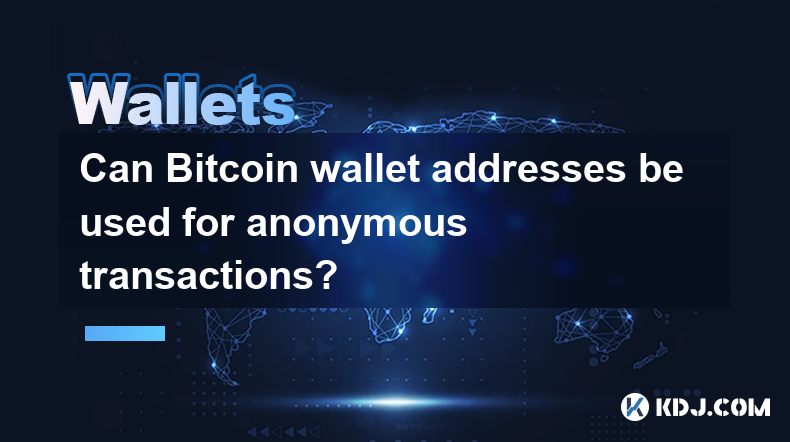
Can Bitcoin Wallet Addresses Be Used for Anonymous Transactions?
Key Points:
- Bitcoin transactions are pseudonymous, not anonymous. While wallet addresses don't directly reveal user identities, they can be linked to individuals through various means, compromising privacy.
- Techniques to enhance privacy when using Bitcoin addresses exist, but they come with their own complexities and limitations.
- Understanding the limitations of Bitcoin's privacy features is crucial for making informed decisions about its use.
- Regulatory scrutiny and blockchain analysis tools continually threaten the effectiveness of privacy-enhancing techniques.
Detailed Exploration:
- The Pseudonymous Nature of Bitcoin: Bitcoin transactions are recorded on a public, immutable ledger – the blockchain. Each transaction involves a sender's address and a receiver's address. While these addresses aren't directly linked to real-world identities, they serve as pseudonyms. This means that while your name isn't explicitly attached to a transaction, the address itself can become a point of identification through various investigative methods. Think of it like using a pen name; while it hides your real name, repeated use of the same pen name in similar contexts could eventually reveal your true identity. The key difference between true anonymity and Bitcoin's pseudonymous nature lies in the traceability of transactions linked to a specific address. A dedicated investigator with sufficient resources could potentially link a series of transactions involving the same address to a specific individual or entity through various techniques, including IP address tracking, exchange KYC (Know Your Customer) records, and analysis of on-chain behavior. The more transactions an address participates in, the greater the risk of its association with a specific identity. This is a crucial point often misunderstood by those seeking absolute anonymity through Bitcoin.
Techniques for Enhancing Privacy: Despite Bitcoin's inherently pseudonymous nature, several techniques can be employed to increase the privacy of transactions. These techniques, however, often involve complexities and trade-offs.
- Using Multiple Addresses: Instead of using a single address for all transactions, employing multiple addresses for different purposes significantly reduces the chances of linking various activities to a single identity. For example, you might use one address for receiving income, another for online purchases, and a third for sending funds to another person. This fragmentation of transactional activity makes it significantly more difficult to track all activities back to a single individual. The complexity increases exponentially with the number of addresses used and the careful management of these addresses becomes crucial. However, this method doesn't provide complete anonymity; skilled blockchain analysts could still potentially identify patterns and links between different addresses controlled by the same individual.
* **Coin Mixing Services (Mixers/Tumblers):** Coin mixing services aim to obscure the origin of Bitcoin by pooling funds from multiple users and redistributing them in a way that makes it difficult to trace the original source. These services function by breaking the direct link between the input and output addresses. However, the use of these services itself can raise red flags and attract unwanted attention from law enforcement and regulatory bodies. Moreover, the trustworthiness and security of such services need to be carefully considered, as malicious actors could potentially steal or manipulate funds. The choice of a reputable and secure mixing service is paramount to avoid potential risks. The transparency of the service's operation and its security measures are key considerations before using such a service.
* **Privacy-Focused Wallets:** Several cryptocurrency wallets are designed with privacy enhancements built-in. These wallets often incorporate features such as coin mixing, obfuscation techniques, and advanced privacy protocols to help users maintain a higher degree of anonymity. However, it is vital to remember that no wallet can guarantee complete anonymity. These wallets still rely on the underlying Bitcoin blockchain, which remains publicly accessible. Thorough research into the security and reputation of a privacy-focused wallet is essential before entrusting it with your funds.
* **Using a VPN:** A Virtual Private Network (VPN) can mask your IP address, making it more difficult to trace transactions back to your physical location. While this doesn't directly anonymize the Bitcoin transaction itself, it adds an extra layer of obfuscation by concealing your internet connection details. However, it's important to note that even with a VPN, sophisticated tracking techniques can still potentially uncover your identity, especially if the VPN provider itself is compromised or cooperating with law enforcement. Choosing a reputable VPN provider with a strong no-logs policy is crucial for enhancing privacy.
- The Evolving Landscape of Bitcoin Privacy: The regulatory landscape surrounding Bitcoin is constantly evolving. Governments and law enforcement agencies are increasingly investing in blockchain analysis tools and techniques to trace cryptocurrency transactions. This ongoing development makes it increasingly challenging to maintain a high level of anonymity when using Bitcoin, regardless of the privacy-enhancing techniques employed. Furthermore, exchanges and other cryptocurrency service providers are subject to Know Your Customer (KYC) and Anti-Money Laundering (AML) regulations, requiring them to verify the identities of their users. This regulatory pressure significantly impacts the anonymity offered by Bitcoin, particularly for users who need to interact with regulated entities. The continuous arms race between privacy-seeking individuals and increasingly sophisticated tracking methods creates a dynamic environment where the effectiveness of privacy-enhancing techniques is constantly under threat.
- The Importance of Realistic Expectations: It's crucial to understand that complete anonymity in Bitcoin transactions is practically impossible. While techniques can enhance privacy and make it more difficult to trace transactions, they do not provide absolute guarantees. The public and immutable nature of the blockchain inherently limits the level of anonymity achievable. Users should have realistic expectations about the level of privacy they can achieve and should carefully consider the risks involved before engaging in transactions that require a high degree of anonymity.
FAQs:
Q: Can I use Bitcoin completely anonymously?
A: No. Bitcoin transactions are pseudonymous, not anonymous. While you don't use your real name, your wallet addresses can be linked to your identity through various methods. Complete anonymity is practically impossible.
Q: Are Bitcoin mixers safe to use?
A: The safety and legality of Bitcoin mixers are highly debatable. While they can enhance privacy, they can also be used for illicit activities, making them a target for law enforcement. Choose carefully and understand the risks involved.
Q: How can I increase my Bitcoin transaction privacy?
A: Use multiple addresses, consider privacy-focused wallets, use a VPN, and understand the limitations of each technique. No single method guarantees complete anonymity.
Q: Is using a VPN enough to ensure Bitcoin transaction anonymity?
A: No. A VPN masks your IP address, but doesn't anonymize the transactions themselves. It's just one layer of privacy enhancement. Sophisticated tracking methods can still potentially link transactions to your identity.
Q: Are all Bitcoin wallets equally private?
A: No. Some wallets are designed with privacy features in mind, incorporating techniques like coin mixing or enhanced address management. However, even these wallets don't guarantee complete anonymity. Research is vital when choosing a wallet.
Q: What are the legal implications of using privacy-enhancing techniques for Bitcoin transactions?
A: The legality of using privacy-enhancing tools varies by jurisdiction. Some jurisdictions may view their use with suspicion, particularly if they are used in conjunction with illicit activities. It's crucial to understand the laws in your location before using such techniques.
Q: Can blockchain analysis completely uncover the identity of a Bitcoin user?
A: While blockchain analysis can be very effective in tracing transactions and linking them to identities, it's not foolproof. The effectiveness depends on the sophistication of the analysis, the amount of data available, and the privacy-enhancing techniques used by the user. It's a continuous arms race between those seeking anonymity and those seeking to uncover it.
Disclaimer:info@kdj.com
The information provided is not trading advice. kdj.com does not assume any responsibility for any investments made based on the information provided in this article. Cryptocurrencies are highly volatile and it is highly recommended that you invest with caution after thorough research!
If you believe that the content used on this website infringes your copyright, please contact us immediately (info@kdj.com) and we will delete it promptly.
- Qubetics Emerges as the Infrastructure-Backed Project to Watch, Outperforming All Other Cryptos in ROI Projections
- 2025-05-14 11:05:13
- Toncoin (TON) Shows Early Signs of Consolidation After Notable Rally
- 2025-05-14 11:05:13
- While PEPE and SHIB Chase Pumps, Web3 ai Builds Real AI Tools With Huge ROI Potential of 1747%
- 2025-05-14 11:00:30
- title: Crypto Market Poised to Replicate the Dot-com Bubble, Triggered by a Surge in Internet Adoption
- 2025-05-14 11:00:30
- OM (OM) Token Could Hit $1 Soon: Here's a Grounded Take
- 2025-05-14 10:55:13
- XRP Price To Still Rally To $1,000
- 2025-05-14 10:55:13
Related knowledge
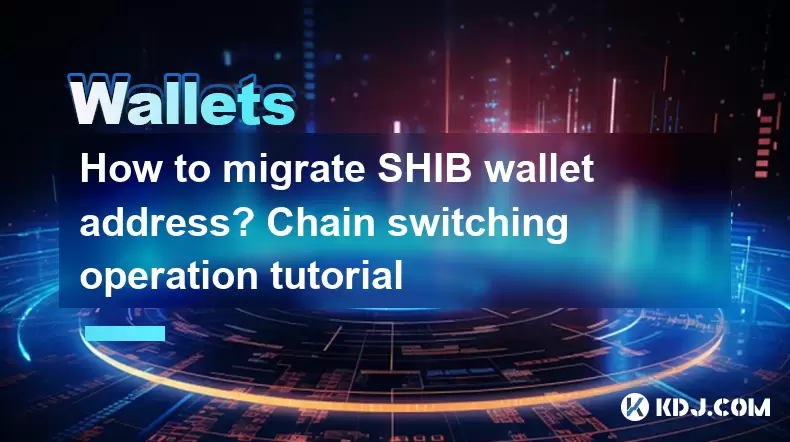
How to migrate SHIB wallet address? Chain switching operation tutorial
May 14,2025 at 07:35am
Migrating your SHIB wallet address and performing a chain switching operation can be crucial for managing your cryptocurrency effectively. This process involves several steps that need to be followed carefully to ensure that your assets remain secure and accessible. In this tutorial, we will guide you through the process of migrating your SHIB wallet ad...
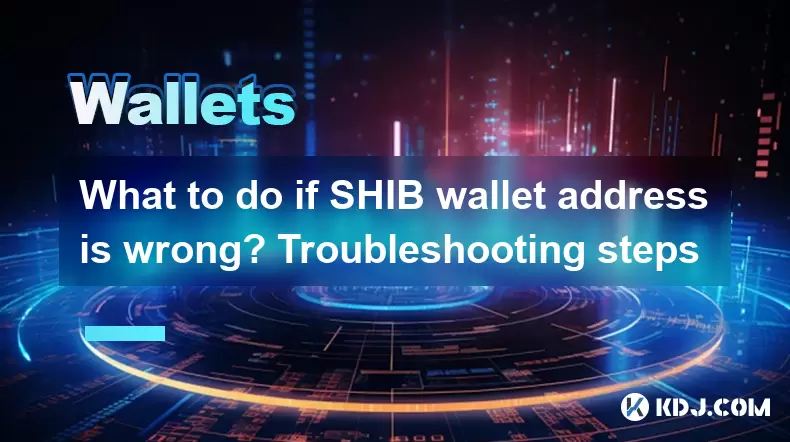
What to do if SHIB wallet address is wrong? Troubleshooting steps
May 14,2025 at 04:28am
If you've entered the wrong SHIB wallet address, it can be a stressful situation, especially if you've already sent your SHIB tokens. However, there are several steps you can take to troubleshoot and potentially resolve the issue. Let's walk through the process step-by-step. Verify the Transaction DetailsThe first thing you should do is verify the trans...
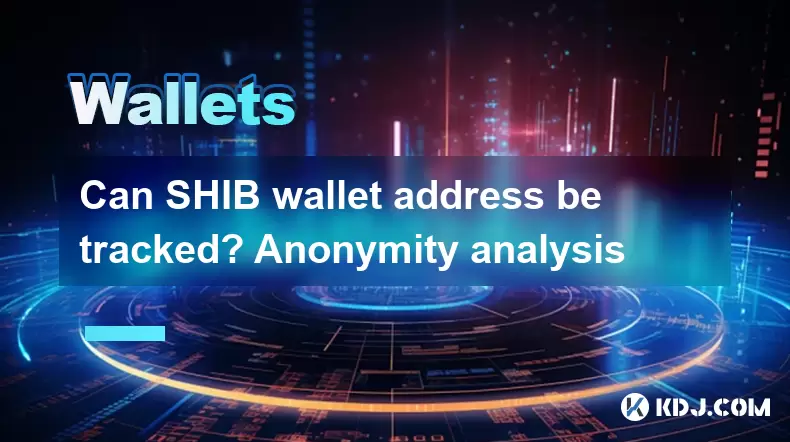
Can SHIB wallet address be tracked? Anonymity analysis
May 14,2025 at 06:50am
The question of whether a SHIB wallet address can be tracked and the level of anonymity it provides is a crucial concern for many users in the cryptocurrency space. SHIB, or Shiba Inu, is a popular meme token that operates on the Ethereum blockchain. Understanding the traceability of SHIB wallet addresses involves delving into the nature of blockchain t...
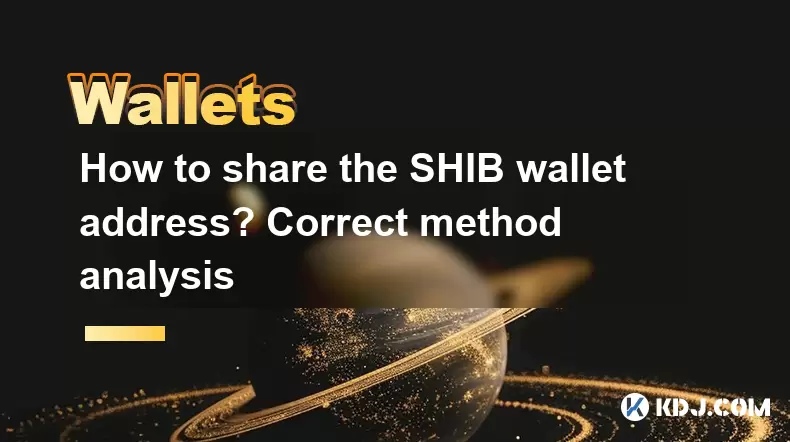
How to share the SHIB wallet address? Correct method analysis
May 14,2025 at 02:50am
Sharing your SHIB wallet address is a common task for those involved in the cryptocurrency world, particularly if you're dealing with Shiba Inu (SHIB) tokens. However, it's crucial to understand the correct methods to share your wallet address to ensure the safety and security of your funds. This article will guide you through the process and highlight ...
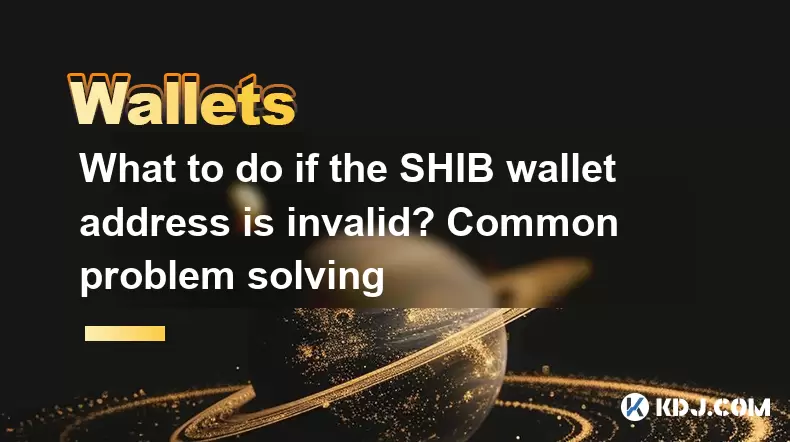
What to do if the SHIB wallet address is invalid? Common problem solving
May 14,2025 at 09:14am
If you're dealing with an invalid SHIB wallet address, it can be a frustrating experience, especially if you're trying to send or receive SHIB tokens. Understanding why this happens and how to solve it is crucial for anyone involved in the cryptocurrency space. This article will guide you through the common issues associated with an invalid SHIB wallet ...
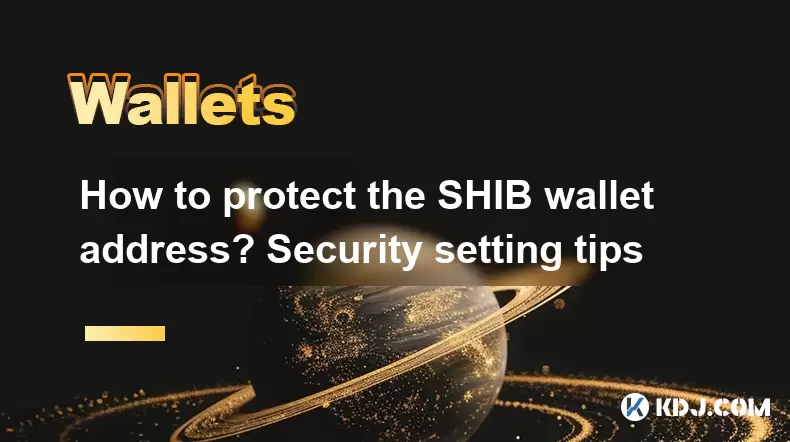
How to protect the SHIB wallet address? Security setting tips
May 13,2025 at 04:07pm
Protecting your SHIB wallet address is crucial to safeguarding your cryptocurrency assets. With the rise of digital currencies, securing your wallet has become more important than ever. This article will provide you with detailed security setting tips to ensure your SHIB wallet remains safe from potential threats. Understanding SHIB Wallet SecurityBefor...

How to migrate SHIB wallet address? Chain switching operation tutorial
May 14,2025 at 07:35am
Migrating your SHIB wallet address and performing a chain switching operation can be crucial for managing your cryptocurrency effectively. This process involves several steps that need to be followed carefully to ensure that your assets remain secure and accessible. In this tutorial, we will guide you through the process of migrating your SHIB wallet ad...

What to do if SHIB wallet address is wrong? Troubleshooting steps
May 14,2025 at 04:28am
If you've entered the wrong SHIB wallet address, it can be a stressful situation, especially if you've already sent your SHIB tokens. However, there are several steps you can take to troubleshoot and potentially resolve the issue. Let's walk through the process step-by-step. Verify the Transaction DetailsThe first thing you should do is verify the trans...

Can SHIB wallet address be tracked? Anonymity analysis
May 14,2025 at 06:50am
The question of whether a SHIB wallet address can be tracked and the level of anonymity it provides is a crucial concern for many users in the cryptocurrency space. SHIB, or Shiba Inu, is a popular meme token that operates on the Ethereum blockchain. Understanding the traceability of SHIB wallet addresses involves delving into the nature of blockchain t...

How to share the SHIB wallet address? Correct method analysis
May 14,2025 at 02:50am
Sharing your SHIB wallet address is a common task for those involved in the cryptocurrency world, particularly if you're dealing with Shiba Inu (SHIB) tokens. However, it's crucial to understand the correct methods to share your wallet address to ensure the safety and security of your funds. This article will guide you through the process and highlight ...

What to do if the SHIB wallet address is invalid? Common problem solving
May 14,2025 at 09:14am
If you're dealing with an invalid SHIB wallet address, it can be a frustrating experience, especially if you're trying to send or receive SHIB tokens. Understanding why this happens and how to solve it is crucial for anyone involved in the cryptocurrency space. This article will guide you through the common issues associated with an invalid SHIB wallet ...

How to protect the SHIB wallet address? Security setting tips
May 13,2025 at 04:07pm
Protecting your SHIB wallet address is crucial to safeguarding your cryptocurrency assets. With the rise of digital currencies, securing your wallet has become more important than ever. This article will provide you with detailed security setting tips to ensure your SHIB wallet remains safe from potential threats. Understanding SHIB Wallet SecurityBefor...
See all articles






















































































